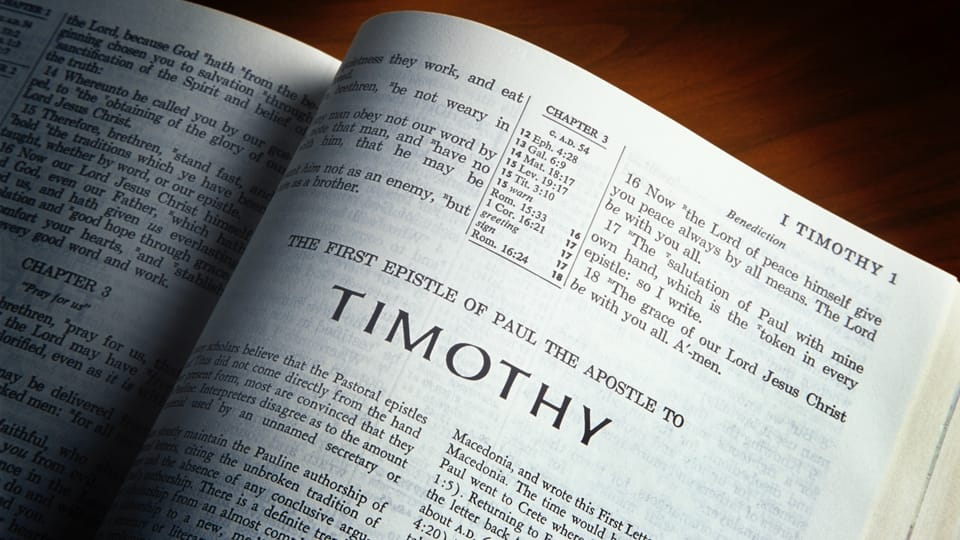Does Gender Matter in Ministry? Part One (1 Timothy 2:9-15)

Big Idea: God has established distinct gender roles, designating some leadership positions for men while recognizing the equal value and contributions of women in other areas.
There is a book out with the wonderful title: Trembling at the Threshold of a Biblical Text, and that's how I feel tonight. I approach this text with a great deal of respect and a little bit of fear for two reasons.
First, the text we have before us is a difficult one to understand. Anyone who approaches this text thinking that it is simple and straightforward simply doesn't understand the issues involved. The passage poses complex questions, and notably, one key word appears only once in the entire New Testament. We need a great deal of divine wisdom as we approach this text.
The second reason I tremble at the threshold of this biblical text is that the stakes are so high. This is probably the key text in the New Testament on the role of women. It is the clearest in its apparent prohibition, and in my opinion, the most difficult to explain away. This is the primary interpretation used to restrict women from roles such as teaching, leading, or even voting within the Christian community.
Because of the difficulty of this text, and the fact that the stakes are so high, I want to do three things. Tonight I'm going to lead you through this text and teach it. I will reach some preliminary conclusions tonight, but in two weeks, I plan to revisit and discuss the role of gender in ministry for the church. We need to confront and address the issue of gender in ministry; ignoring it won't benefit anyone. Then, finally, we will have some questions and answers.
But before I begin to look at this text, let me quote from a description of the book I mentioned, Trembling at the Threshold of a Biblical Text: "Interpreting the Bible, whether you are a scholar, pastor, or layperson, is a serious responsibility. Is the Bible really saying what you think it's saying?" And I would add another two questions:
- Are you reading your ideas into the text?
- Are you coming to the Bible with your mind already made up?
Tonight we need to approach this text with humility and wisdom.
Before we do so, let's pray. Father, thank you for the privilege of studying your Word. Tonight, we will tackle a passage that needs our best understanding and the guidance of the Holy Spirit. So be with us. Prevent us from error and glorify your Son's name. Amen.
The Text
In 1 Timothy 2, Paul is addressing the subject of public worship – specifically praying – within the church. In verse 8, he turned his attention to men and wrote: "I want men everywhere to lift up holy hands in prayer, without anger or disputing." It appears that this was the type of instruction that the men needed.
In verse 9, Paul continues by literally saying, "In the same way…" Paul focuses specifically on the clothing women wear to church, rather than women's attire in general. He advises that women should dress modestly. Don't become preoccupied with the externals of beauty, as one commentator says. It's not, as the King James translates it, shamefacedness. Rather, it carries with it the idea of shunning that which is repugnant in the area of dress.
The second word is propriety—a word that means self-mastery in the physical appetites. It is good self-government, and reign over one's passions and desires. Applied to women and their dress, it had a sexual nuance. That's how women are to dress. Not, as Paul says, "with braided hair or gold or pearls or expensive clothes." Paul is describing the dress of well-off women in that society. His point is not that women should lack adornment in the church, or that women today should not have braids in their hair or wear pearls. Paul's concern is that women do not flaunt their wealth in extravagant displays of luxury. It appears that some were flaunting their dress, jewelry, and lifestyle in a way that hurt the poor and disturbed the church. Paul says that what really counts is "good deeds, appropriate for women who profess to worship God."
Here, we encounter what seemingly represents a clear and enduring prohibition against women serving in teaching or leadership roles within the church, as stated in 1 Timothy 2:11: "A woman should learn in quietness and full submission." Silence was required of women within Jewish synagogues. Within the church, however, there was a sort of emancipation of women. Women were experiencing their newfound freedom and liberty in Christ. Even here, Paul says something revolutionary for that day. He said a woman should learn – something that was not encouraged in most of the world at that time.
And how are women to learn? In quietness—not absolute silence, as some people interpret it, but rather as opposed to teaching. And in full submission, at least to their husbands, but possibly to the male leaders of the Ephesian church. Next, we encounter the crucial prohibition found in verse 12: "I do not permit a woman to teach or have authority over a man; she must remain silent."
Paul here appears to link two actions together: teaching and having authority. In some way, it would appear, the act of teaching is tantamount to having authority. The word "authority" is not the usual word that Paul uses. Some have created complex theories about the word's meaning, but it seems to simply mean "to dominate or misuse authority." It would appear to refer to the exercise of the office of elder or pastor. It reflects an effort to restore peace in worship by limiting women's roles in that church at that time.
Questions About the Text
Now, let's ask some questions.
Why did Paul place these limits on women?
It's pretty clear that some restrictions were placed on women, at least at that time and in that church. The question is, why? Let me give you a few options.
Option one: Paul prohibits women from teaching in that congregation due to some teaching false doctrines. In other words, the problem is not women teachers in general. The problem is that the women teachers in Ephesus at that time were untrained and were teaching false doctrines. In 1 Timothy, Paul addresses the issue of false teachings infiltrating the Ephesian church by taking decisive action to silence those within the congregation spreading these erroneous doctrines, particularly targeting women who were leading this misleading instruction. In this case, the prohibition would not be a permanent one. It was a temporary restraining order to curb the activities of certain women in that congregation at that time.
Option two: Paul is prohibiting all women, at all times and everywhere, from serving as elders. In other words, it is a permanent prohibition against women pastors, or women who teach and have authority.
Which view is right? Well, to find out, we have to look at verses 13 and 14: "For Adam was formed first, then Eve. And Adam was not the one deceived; it was the woman who was deceived and became a sinner."
The two reasons for the prohibition are the creation order and the order in which Adam and Eve were deceived. In other words, Paul is basing the prohibition on Genesis 2 and 3.
It's possible that here Paul is correcting the false teaching present in Ephesus. In other words, he's saying, "Your false teachers are saying that Eve was created first. Let me tell you something. Genesis 2 and 3 are clear on this. Adam was created first, and then Eve." It's possible also that Paul was teaching a timeless principle that applies to all ages. In this case, the order in which man and woman were created says something about their relationship. There is a difference not in dominance, but in role. The distinction between the sexes, in this case, existed before the fall. God's plan for a woman is rooted, therefore, not in time or culture, but in creation itself.
Further, Eve serves as a prototype or representative of all women. It's not as if Adam wasn't guilty; Paul made that clear in other passages. But Eve was a model to describe the dangers posed by false teaching. Because the woman was deceived, as Paul stated, women should not hold teaching roles such as elder or pastor during church services.
Which view is right? Is Paul addressing a mistake in the Ephesian church, or is he suggesting that the creation order implies certain roles for men and women? The answer, I believe, is found in other Scriptures. The birthright, you know throughout Scripture, belongs to the eldest. The birthright belongs to the oldest son, and carries with it the idea of leadership. The creation of Adam first signifies, as supported by various Scriptures, a lasting distinction in the roles assigned to men and women by God. In fact, Paul uses the same argument in other passages such as 1 Corinthians 11:7-9.
Verse 15 concludes with a puzzling statement: "But women will be saved through childbearing–if they continue in faith, love and holiness with propriety."
This is perhaps one of the most troublesome verses in the New Testament. There are a number of different interpretations. But let me give you what I believe to be the compelling, majority view. The false teachers of that day had a very disparaging view of sex. Genesis 3:16, however, predicted that motherhood would be a woman's appointed role. Paul is arguing that the role of mother is an important one that we shouldn't discard. It's not just acceptable; it's good and should be embraced. It's not second class. It's good. Not every woman will marry or have children, but a woman who embraces God's plan for her, whether married or single, will honor God by living in faith, love, and holiness with decorum.
Some Conclusions
You might be lost in what has been a more technical discussion than usual, or you may not be too convinced. But let me draw some conclusions before we return in two weeks to draw some applications for the church today.
My first conclusion is that this passage is a difficult one. It is not as straightforward as some people might have led you to believe. There are different interpretations. I believe I've guided you to the right interpretation tonight, but let's stay humble and acknowledge that this isn't definitive. Entire books have been written on this passage.
My second conclusion is that we must take our cues from Scripture rather than our own minds or culture. It seems deeply offensive at first to think that women might be prohibited in any way. But we must choose to submit to God if that is what he is saying, as offensive as it might be to some of us. Within my heart, I would tend to be a complete egalitarian. Why? Because I'm a product of my culture, and because I have a deep and abiding respect for women. I sometimes wish I could support the egalitarian view of this passage, but I believe the evidence suggests otherwise, so I must adhere to Scripture.
My third conclusion is that there is a permanent and abiding distinction in the roles of men and women. While there is no difference in equality or value, this passage suggests a distinction in roles within the church.
My fourth conclusion is that this passage, in my view, does not prohibit women from everything people say it does. And with this, I'll close. This passage, along with the creation order and other texts, suggests that men and women have different roles. But it doesn't go as far as some people would argue. This passage, in my opinion, is a timeless prohibition against women serving as elders or pastors of a church. I don't believe there is a prohibition against women voting in the church, participating in important ministries, or teaching under the guidance of male elders. It's a prohibition that applies within the context of the church. There is a role for women to be on the platform; for women to use the spiritual gifts that God has given them. And it certainly isn't an excuse to view women as second-class citizens.
We'll talk more in two weeks about some applications on this topic, but I invite you to do something. In two weeks, when we meet, I will give you some of my thoughts on how this applies to our church. But I also want to give you an opportunity to ask questions. If you would write them out and submit them to my office within the next week, that would give me time to respond to them. If we get enough, we might take a whole night to do so. But let's close tonight by praying that we, as men and women, may be everything God has designed us to be.





